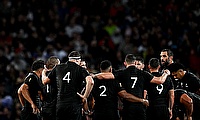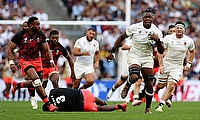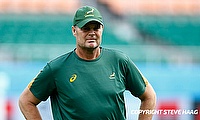Not just there to make up numbers!
Wednesday 21 September 2011
So far, the rugby world cup has failed to disappoint. There have been numerous close encounters already and it seems that this year, the highly sought after Webb Ellis trophy is open to a number of different teams, presenting a more open world cup than previously witnessed. The minnows of yesteryear have been improving at breakneck speed since 2007 and are no longer the puppy dogs of the rugby world, expected to roll over in awe of their superior opponents. Classic examples thus far in the tournament are Japans effort against France, Romania pushing Scotland to the edge, and, most recently, Georgia's first half display against England. Although such teams are not the finished article, it is becoming increasingly clear that 'the gap' between the established and the developing is closing.
It can be argued, however, that teams who fall outside of the 'top-tier' in International rugby are not getting a fair crack of the whip. There has been uproar this week following the recent comments made by Samoa and Gloucester centre Eliota Fuimaono-Sapolu on Twitter, in the wake of their defeat to Wales at Hamilton on Sunday. Stating that Wales' 7 rest days to Samoa's 4 was the reason why they lost: 'Give Wales 3 days off and give Samoa a week! We would kill them!' His tweets suggested that his side were the victim of injustice comparable to that of the Holocaust, Apartheid and slavery, a statement which undermines the tragedy of such events whilst also making himself look very silly. However, overtly exaggerated comparisons aside, does he have a point? The fixture schedule of the World Cup provides many developing nations with a serious thorn in their side, one which is not felt by other 'in-demand' sides. Around 60% of the IRB's revenue is gained through television broadcasting, and this 60% is only achievable by placing in-demand sides during prime time places for maximum commercial profits, leaving the less popular sides to fill in the midweek gaps. It's a catch 22 for teams such as Samoa, who, without the funds gained by IRB would not be at the stage they are at now, yet will always face an uphill struggle due to commercial demands until things are changed. The IRB has previously proposed to cut the tournament down to 16 sides which would ease congestion on the fixture list, however, this would be counterproductive to the ethos of the IRB who's aim is to help develop the game and not exclude others from it.
Eliota's comments have gone without punishment as a formal apology was accepted by the IRB from the Samoan RFU. Essentially there has not been much 'hoo haa' directed at the more congested fixture lists of the developing nations; most have taken it in their strides. But perhaps Eliota's outburst is the start of things to come; he, Samoa and other developing countries have every right to feel aggrieved. The fact of the matter is that the format cannot be changed unless the participation of others is sacrificed, something which no one would like to see. As unjust and crude as it may sound the commercial revenue unfortunately dictates who and when, and for a small country like Samoa this will always fall behind its rivals.
The Samoan performances of late have turned many-a-head, from their defeat of the Wallabies in Sydney during the summer to the demolition of Namibia and their valiant display against Wales, Samoans have much to look forward to. They are still, of course, in contention of reaching the quarter finals and no one could rule out a shock upset against the Springboks. Nevertheless, the injustices highlighted by Eliota will be increasingly harder to ignore by the IRB so long as they continue to produce the talent and perform as they have done over the past few months.








